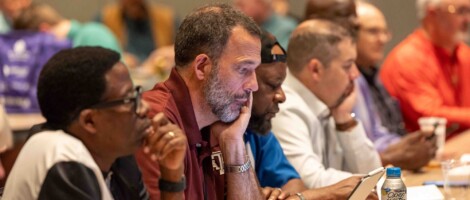Growing healthy churches involves focus on true mission from God
by Teresa Young on November 18, 2025 in News

Taking a healthy church to the next level involves six strategic steps, all aimed at refocusing them on the true mission from God, according to workshop leader Jonathan Smith, associate director of the Center for Church Health at Texas Baptists.
In a Monday afternoon workshop, Smith provided some statistical truths about the state and what he called an Acts 2 opportunity to reach the 31.8 million residents of Texas. While growth is coming, he said 85-95 percent of the state’s churches are plateauing or declining in attendance, and that applies to about 74 percent of Texas Baptists churches.
Smith said that the trend can be attributed to three main reasons: Disobedience to the Great Commission; the program becomes the mission; and refusal to evaluate ministry effectiveness.
“Discipleship and evangelism are not just things we should do, but it is disobedience if they are not happening consistently with believers. Leadership is stewardship, and we’re going to be held accountable,” Smith noted. “Our faith is not private but a public matter as we display the very goodness and glory of Christ to those who do not know him.”
Smith then shared six steps to creating a church growth strategy, leading with what he said should seemingly be obvious: teaching the gospel. “It’s amazing how many people in our Texas Baptists congregations do not understand the gospel, so you need to be sure everyone in your congregation knows what the gospel is and what it is not,” he said.
Secondly, he encouraged churches to define their Acts 1:8, the command to be witnesses in Jerusalem – which Smith defined as the community – and into Judea (the region or state). The verse also references Samaria, which Smith said represents harder places to go, like further mission trips, and then to the ends of the earth.
“Make sure your mission isn’t too small. Make your people feel like it’s unaccomplishable,” Smith said, noting that it builds a reliance on God and not on their own resources. “Don’t do one-offs. Commit to going to the same place for three years in a row. You cannot out-mission the Messiah!”
The third step in Smith’s plan was to better define the church’s Jerusalem, a measure of the realistically reachable area. He said that in urban areas, that should be a 10-minute drive, while in suburban areas can expand to a 15-minute drive. Rural areas can allow for a 20-minute drive, and the boundaries can be logical, like school districts. Once mapped, he suggested pulling data on the number of people and families within an estimate of how many are without Christ and how many are in poverty. Then ask key community individuals to share issues happening so the church can be fully aware of how to meet needs in their reachable area.
Smith also suggested churches regularly equip their congregations to live missionally. He suggested a two-hour conference held annually to share skills such as gospel conversations, praying with friends, listening skills, neighboring well, living as believers in normal rhythms and basic hospital visit skills. “The true measure of a healthy church is not how many come in for worship but how many are sent out in ministry,” he said.
The fifth step is displaying kingdom momentum, which Smith defined as celebrating those moments that show kingdom impact to members and help theme get excited about living out the mission. Examples of these “momentum moments” include baptisms, mission trip reports, new member celebrations, changed lives sermons, VBS music, children’s Sundays, student Sundays, new ministry launches, God stories and baby dedications.
Finally, Smith spoke directly to pastors, encouraging them to change their pastoral ministry from chief chaplain to lead missionary and evangelist. He urged leaders to equip and mentor others within the church to serve in roles that multiply the pastoral impact and free them to lead strategy and equip congregants for outreach efforts.
“You don’t have to quit making hospital visits. But you can equip the church to see that others can minister to members and serve them well,” he said.
Strengthening a multiplying movement of churches to live out the Great Commandment and Great Commission in Texas and beyond.
The ministry of Texas Baptists is made possible by giving through the Texas Baptists Cooperative Program, Mary Hill Davis Offering® for Texas Missions, Texas Baptists Worldwide and Texas Baptist Missions Foundation. Thank you for your faithful and generous support.
Subscribe to receive stories like this one directly to your inbox.
We are more together.
Read more articles in: News, Annual Meeting
More from Teresa Young
- Texas Baptists Indemnity Program offers additional options for church insurance coverage
- Pastor Strong program helps ministers maintain health on all levels
- Missions Dinner emphasizes church planting successes
- Elijah Brown urges Texas Baptists to follow the first church’s paths to further the gospel
- Churches encouraged to awaken their hearts for missions to see gospel growth